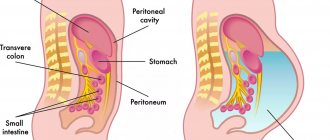Stomach cancer is one of the most common and at the same time insidious oncological diseases. In terms of the frequency of deaths, it is in second place, second only to lung cancer. The reason for the high mortality rate in this disease lies in the difficulty of timely diagnosis. It is very difficult to identify the disease in the early stages, since the symptoms of stomach cancer are often very vague and patients most often do not pay attention to them. And in later stages, this disease is already difficult to treat.
Stomach cancer and features of its manifestations
An ulcer that has developed into cancer
When you consult a doctor and diagnose cancer in its early stages, the possibility of complete relief from the disease is very high, and the five-year survival rate is close to 80-90%. But, in most cases, the diagnosis of stomach cancer occurs at later stages, which greatly reduces the five-year survival rate. Therefore, you should know the first, most common symptoms of cancer and, at the slightest suspicion, undergo a more detailed examination.
Symptoms of stomach cancer are not always the same in different patients. Depending on the location of the tumor and its histological type, symptoms can vary significantly. The location of the tumor in the cardiac part of the stomach (the part adjacent to the esophagus) is primarily indicated by difficulties in swallowing rough food or large pieces of it, and increased salivation. As the tumor grows, the symptoms become more pronounced. After some time, other signs of a tumor develop: vomiting, a feeling of heaviness in the chest, between the shoulder blades or in the heart area, pain.
If the primary tumor is located in the lower part of the stomach (the so-called antrum), then the symptoms will be slightly different. In such cases, the patient complains of vomiting, a feeling of heaviness, and an unpleasant odor from the mouth or vomit. General oncological manifestations indicate that the body is affected by a tumor: lack of appetite, weakness, dizziness, anemia, weight loss, etc. There are no pronounced symptoms in the case of a tumor of the middle part of the stomach.
Depending on the presence and nature of symptoms, the doctor can determine the need and types of further diagnostics. But still, there are many more symptoms of stomach cancer than described above.
Cough
The main cause of chronic cough is cigarette smoking. This cough is the result of irritation caused by chemicals in cigarette smoke. But the same toxic compounds that cause a smoker's cough can also cause much more serious problems, such as bronchitis, emphysema, pneumonia and lung cancer.
Chronic cough should always be considered a warning sign by smokers. The accompanying symptoms should be especially concerning: fever, hemoptysis, shortness of breath, weight loss, weakness, fatigue, loss of appetite, chest pain not caused by coughing, night sweats, wheezing in the lungs.
Cough
Symptoms of stomach cancer in its initial stages
The earliest signs of cancer are so vague and inexpressive that treatment, if they occur, is started in extremely rare cases and, as a rule, does not correspond to the disease. After all, most diseases of the gastrointestinal tract have similar manifestations, and it is extremely difficult to diagnose cancer using them. But, nevertheless, the most probable symptoms of cancer can be identified. These include:
- Digestive disorder. This includes heartburn, frequent belching, flatulence, bloating, and a feeling of heaviness in the stomach. These symptoms were noted by many patients, even over many years of their lives. But they went to see an oncologist only if they had other more serious symptoms.
- Discomfortable sensations localized in the chest area. Such manifestations include pain, a feeling of fullness, heaviness or any other manifestations of discomfort.
- Nausea. Nausea can haunt the patient immediately after each meal and cause discomfort for a long time.
- Difficulty swallowing. This symptom occurs only when a tumor forms in the upper part of the stomach. It may partially obstruct the passage of food, which explains this symptom. In the early stages, difficulties arise only with rough food or large lumps. But as the disease progresses, it becomes more difficult to swallow even soft and liquid foods.
- Vomit. Often, only the appearance of symptoms such as vomiting and nausea lead the patient to be examined. Vomiting can be a one-time or periodic phenomenon, occur immediately after eating or not be associated with food intake at all. The most terrible manifestation is vomiting with scarlet or brown blood. In addition to small but steadily recurring bleeding, anemia, pallor, shortness of breath, and fatigue are associated.
- Presence of blood in stool. This is another symptom of stomach bleeding and stomach tumors. It can be diagnosed in the laboratory or visually by the color of the stool, which in this case is tar-black.
- Painful sensations. Often the pain is felt in the chest area, but the pain can also spread towards the shoulder blade or the heart.
- General clinical symptoms. After the tumor develops and metastases occur outside the stomach, symptoms common to all cancer diseases may appear: weight loss, loss of appetite, fatigue, anemia, lethargy, etc.
- Secondary symptoms. New symptoms indicate the appearance of secondary tumors. Symptoms can be very varied and depend on the direction of metastasis.
The list of the above symptoms is far from complete, but it is these symptoms that should alert the patient and force him to undergo examination in order to begin timely treatment.
Fatigue
The content of the article
Weakness, fatigue, bone pain, swelling, more frequent infections, constipation and arrhythmias are some of the main symptoms of multiple myeloma. The disease is also accompanied by pain in the lumbar region.
Blood tests show elevated levels of protein in the blood or urine and often a three-digit ESR. Multiple myeloma is extremely rare in children, adolescents and young adults. In adults, the risk of developing the disease increases with age. Multiple myeloma is more common in men.
Dyspepsia as a characteristic sign of stomach cancer
Diagnosing cancer is a rather complex process.
Quite often, a patient comes to the doctor with a very common symptom - dyspepsia. Dyspepsia is a disorder of the normal functioning of the stomach, indigestion. In this case, the doctor’s task is to conduct a full examination in order to identify the root cause of such a disorder. Dyspepsia is characterized by the following symptoms:
- feeling of fullness in the stomach;
- decreased or loss of appetite;
- reducing the portion size consumed;
- aversion to previously favorite food, often protein (meat, fish);
- nausea, vomiting;
- lack of pleasure when eating.
If one of the above symptoms appears, there is no need to panic, but a combination of several should alert the patient and force him to contact the appropriate specialist for a thorough examination.
Headache
The most dangerous is a severe headache accompanied by nausea or vomiting. Especially if there is paresis, speech, vision and hearing impairments. These symptoms may indicate a brain tumor. But it is worth remembering that at the first stage of development of a brain tumor, the only sign of the disease may be a change in mood or behavior. The patient finds it more difficult to concentrate and may experience twitching of the facial muscles or seemingly innocent memory impairments.
In children, morning pain and nausea are quite common symptoms, after which the child begins to vomit. In more than 7% of childhood cancers, there are hormonal imbalances that prevent the child from growing and developing.
Simple tests that determine further diagnosis are an examination of the fundus and EEG, that is, a study of the electrical activity of the brain.
Diagnosis of stomach cancer in laboratory conditions
The majority of patients (60-85%) experience symptoms of anemia caused by chronic blood loss and the toxic effect of tumor cell metabolites on the red bone marrow. When testing for occult blood in stool, a positive result is obtained in 50-90% of cases. The stomach contents are also examined for acidity levels and an increase in beta-glucuronidase activity.
Differential diagnosis
First of all, stomach cancer should be distinguished from benign stomach tumors and peptic ulcers. In all cases, only targeted gastrobiopsy can definitively confirm the diagnosis of stomach cancer.
Heartburn
Heartburn is often caused by neurotic disorders, but in the vast majority of cases, the disease is a consequence of the reverse flow of acidic stomach contents into the esophagus and even into the oral cavity. This phenomenon, known as gastroesophageal reflux, is caused by disruption of the natural barrier between the esophagus and stomach (primarily the lower esophageal sphincter).
Heartburn can also be a sign of functional dyspepsia, malignant neoplasm, biliary tract diseases or gastritis. The latter develops as a result of an imbalance between protective factors and aggressive factors, including Helicobacter pylori infection. Long-term infection with this bacterium can contribute to the development of stomach cancer. Therefore, you should not treat this symptom yourself.
Heartburn
Stomach cancer against the background of peptic ulcer
A tumor can be suspected in the presence of a peptic ulcer based on the following signs:
- uneven edges of the ulcer, undermining of one edge and elevation of the other;
- non-traditional form of ulcer (amoeba-like);
- thickening of the mucous membrane around the circumference of the ulcer, granularity of the mucous membrane;
- bright red color of the edges of the ulcer;
- bleeding, pale, sluggish mucous membrane around the ulcer;
- the bottom of the ulcer is gray, granular, shallow, relatively flat;
- ulceration of the edges of the ulcer.
If such symptoms are present, the patient should undergo a targeted gastrobiopsy; tissue samples must be taken from both the bottom of the ulcer and its edges.
Diarrhea
Regular diarrhea or constipation, as well as changes in the rhythm and sequence of bowel movements, may be signs of changes in the lining of the intestines, including colorectal cancer. An alarming symptom is blood in the stool.
The disease may be accompanied by: persistent, gradually increasing anemia and pale skin, weight loss, and abdominal pain.
Colorectal cancer is more common in men over 60 years of age. Causes include poor diet, genetic factors and smoking.
Stomach cancer and polyps
Surgery to treat stomach cancer
Polypous gastric cancer is a tumor of considerable size (up to 2 cm), similar to a pedunculated node with a wide base. The surface of the polyp is similar in appearance to cauliflower; ulcers, erosions, swelling, and necrosis can be observed at the top of the formation. If the polyp is small in size, has an intact mucous membrane, and has a small stalk with a narrow base, then this indicates a benign tumor.
Most of these polyps are hyperplastic. But we should not forget about the frequent cases (about 40%) of malignancy (the cells acquire the properties of a malignant tumor) of adenomatous polyps. Polyps that have a wide base and significant size are always subject to removal with further study of their structure
Hoarseness
Hoarseness is a sign of weak vocal cords caused by a viral infection, but can also be caused by laryngeal cancer. Malignant neoplasms of the larynx occur predominantly in men, mainly over 60 years of age.
Treatment is effective in approximately 70% of cases. But the cure rate for this type of cancer at an early stage reaches 96-98%, which is why early diagnosis of the disease is so important.
Symptoms of laryngeal cancer are mainly: hoarseness, change in voice, difficulty swallowing, pain radiating to the ear, shortness of breath, hemoptysis, enlarged lymph nodes in the neck, loss of appetite and weight loss.
Problems with urination
Frequent urination in men is most often the result of a benign enlargement of the prostate gland (prostate). But in recent years, the incidence of prostate cancer has increased rapidly, and the symptoms of the pathology are very similar to those of benign lesions. Therefore, every man with the problem of frequent urination should consult a urologist about his problem.
Early detection of prostate cancer increases the chances of cure. To determine your PSA level you need to take a blood test. An increased level of antigen indicates pathological changes in the prostate. However, the detection of elevated PSA concentrations is not synonymous with a diagnosis of cancer.
ONLINE REGISTRATION at the DIANA clinic
You can sign up by calling the toll-free phone number 8-800-707-15-60 or filling out the contact form. In this case, we will contact you ourselves.
Organization of treatment abroad
]Booking Health[/anchor] has been organizing medical tourism in many countries around the world for many years. We have direct contracts with most major clinics in Germany.
Therefore, every patient can receive quality medical services:
- Without intermediaries
- At a reduced price
- Without the need to purchase insurance for foreign patients, the cost of which reaches 50% or more of the cost of the treatment program
- Without the risk that the price will increase during the treatment process
Each Booking Health client receives insurance. It is valid for 48 months and covers any unexpected medical expenses up to 200 thousand euros.
]Booking Health[/anchor] takes care of all organizational issues. We will choose a clinic for you, negotiate with its administration, speed up the start of treatment, prepare documents for you, and translate medical documentation. We will book a hotel for you, meet you in Germany and take you to the clinic by car. You will be able to completely focus on your own health, getting rid of unnecessary worries about organizing treatment abroad.
Our prices
- Primary appointment with an oncologist* RUB 3,500.
- Repeated appointment with an oncologist* RUB 3,000.
- Appointment with an oncologist, primary CM* RUB 4,500.
- Appointment with an oncologist-mammologist KMN* RUB 5,300.
- Repeated appointment with an oncologist, CMN* 4,000 rub.
- Preventive appointment with an oncologist* RUB 1,490.
- Primary appointment with an oncologist-chemotherapist* RUB 4,600.
- Repeated appointment with an oncologist-chemotherapist* RUB 4,000.
- Consultation with an oncologist on palliative care* RUB 2,000.









